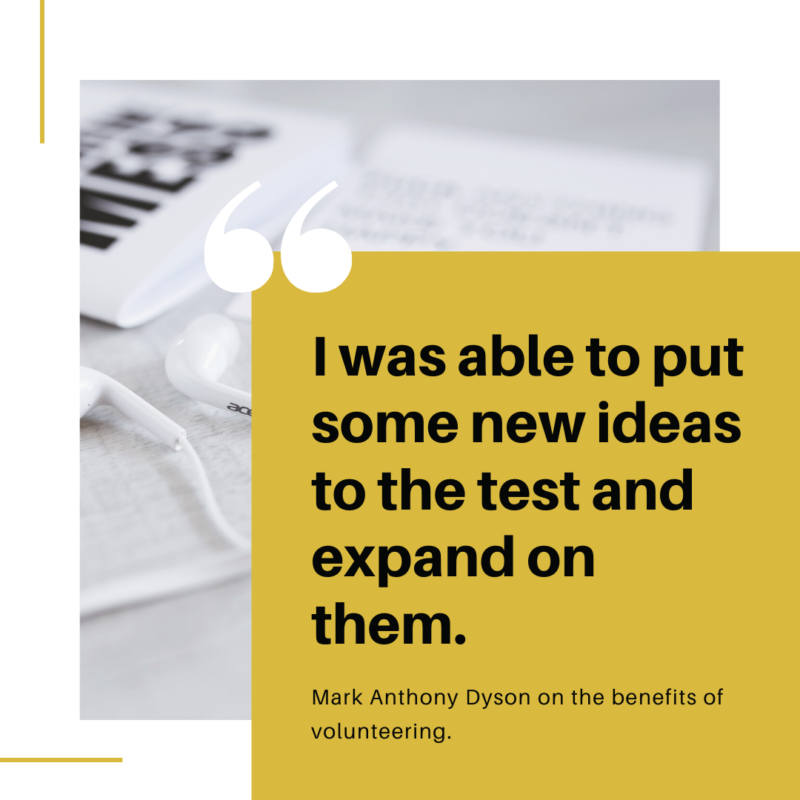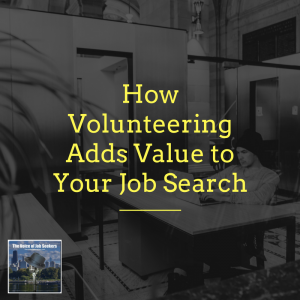
Volunteering will be the answer for job seekers who’ve lost opportunities because they’ve:
- Canceled out-of-state college programs or internships
- Furloughed or laid-off
- Jobs stopped directly due to the COVID-19 outbreak
I wanted to present this interview from 2017 from the “Find Your Dream Job” podcast produced by Macslist. You can listen to the podcast, The Benefits of Volunteering, with Mark Anthony Dyson in its entirety through the link. Below is the transcript of the interview is below.
You’ll find these volunteer ideas are remote ideas, too! You can create ideas if you’re willing to re-imagine projects people would ideally like done.
I hope you’ll find value in this interview and perhaps reshape your thinking to find more opportunities.
Mark Anthony Dyson:
Thanks for having me, Mac. It’s great to be here.
Mac Prichard:
Yeah, it’s an honor to have you. Our topic this week is, as you know, is how volunteering can help your career or even… help you get a job. Let’s start by talking about the benefits of volunteering for people who work full time. And we’ll talk later in the interview about people who are looking for work. But I can imagine that some of our listeners are thinking, “Gosh, it’s difficult to volunteer while working and holding a day job.” What do you say to folks like that? How can volunteering help their career?
Mark Anthony Dyson:
Well, volunteering, first of all is a…. usually, one hundred percent controllable by you, depending on your cause. Now of course if you’re trying… if you’re interested in going into the Peace Corps and working, there are a few possibilities there, but a lot of people do that as sort of a…. a very invested commitment.
As well as some of the other organizations, but there are many organizations that would love to just have you ten hours a week. And if you could do that and do it in a very cheerful and giving way and have some kind of say, is what you could do and use some of the skills that you’ve obtained, it’s a win-win for both sides.
Mac Prichard:
What kind of benefits do you see in the people you work with, Mark, who volunteer, whether it’s ten hours or one hour a week when they get to use those skills for example?
Mark Anthony Dyson:
Well, I think one overall benefit is that people are able to build and control their brand to a great degree. You know, and one of the things we’ll talk about is you get…gain skills, you can put them to the test, through volunteering. And you can create some opportunities that way sometimes, it can go quite a long way.
But all in all, volunteering is also, just so personally gratifying. Knowing that you are helping and making a small difference in a way that can make, not just a difference to your career, but also help other people. Again, it’s one of those double wins. It’s kinda hard to, once you do it, and you begin to see some of the fruits of it, it can be a fantastic opportunity for your career overall.
Mac Prichard:
I certainly, in my own career, and in the people, we work within Mac’s List see the personal satisfaction that people get from volunteering.
You mentioned brands and personal brands, Mark. Tell us more about how volunteering can either improve your brand or help you take it in new directions.
Mark Anthony Dyson:
Well, I think when people see you as a volunteer; especially, if it’s, if you’re in the jump on mode, organizations that will vet you will look at volunteering as a very positive thing, much less… other than, you know, trying out new skills, and making them more fruitful. They can connect with you on volunteering, especially if your cause and your personal cause aligns with the organization, that is seen as a plus.
Mac Prichard:
Okay, so it’s a good way to break out of a box you might have been put in in your nine to five job where people think you only have certain kinds of skills. And you have a chance when volunteering to show off new skills or develop new ones.
Mark Anthony Dyson:
Yeah. Right, and you can even sharpen those newly obtained skills right away. I remember when I first learned Microsoft office back in the middle nineties, and not only was my boss interested in the investment of the skills, but I was able to turn that around and use that for… to help my church, and that effort was doubly appreciated. So for me, I got the best of both worlds in a sense.
But the practice itself also expanded my ability to use those skills. So very quickly I was able to be more useful than just coming back and sitting at my desk and knowing not what to do. I was able to put some new ideas to the test and expand on them.
Mac Prichard:
Yeah, so volunteering at your church made you a more experienced word processor, at least a Microsoft word expert, and your office and your boss saw those benefits during the workday.
Mark Anthony Dyson:
Yeah, exactly, it was actually Excel. Excel was the gold standard. And that was at a time when people were starting to migrate from Lotus to Excel, and it was great to have. And I remember being able to use that in a project for my church, and it really was a double win for me because it gave me more experience. So when I was able to get a promotion, the next time around I had it in the bag. I was ready to go.
Mac Prichard:
Got it. Well, for the benefit of listeners who weren’t there in the ’80s and early ’90s, Lotus123 was a precursor of Excel, and it…. Yeah. Before that there was something called Visicalc (https://en.wikipedia.org/wiki/VisiCalc) …. But I’m really dating myself.
Mark Anthony Dyson:
Well, I’ve already done the damage so..
Mac Prichard:
So I liked also your point, Mark, about how when you volunteer for an organization or a cause, it can create a personal connection with people who look at your resume, or your LinkedIn profile, that might not otherwise be there.
Mark Anthony Dyson:
Exactly. I mean, when you, you know…. We encourage job seekers to do research on a company. When you see that they have a cause that you either worked for a similar cause or a cause that you are interested in, that’s a way to connect with the employer.
There have been a couple of times when as an experiment, that I suggested to somebody who’s already working pretty solid in their career, but they were interested in this company to work for, it was one of the larger technology companies around. And I suggested, “Well, you like to do what they do.” And because they had some press on it, so I suggested, “See if you can volunteer on the same day and connect with a couple of people who… maybe network with them.” And not only did they do that, but they were able to get an interview. They didn’t get the job, but they… there was a watershed moment for them; that they saw their volunteer efforts as more than just something that was…you know… just to be personally satisfied. It was a way to create an opportunity.
Mac Prichard:
So they were able to build a relationship outside of the traditional application process, and they basically, in a professional way, went around HR.
Mark Anthony Dyson:
Exactly, exactly. Isn’t it the job search, I mean, the best way to go about the job search, is to exert a little disruption. You know, you’re disrupting the online application, and the resume, and all the screening process, by getting a referral inside. And being that you talked to an employee as somebody who likes you because you have something in common. Why not disrupt the process that way?
Mac Prichard:
So that’s terrific. And you’re preaching to the choir here; we’re all about the hidden job market at Mac’s List and looking for ways to build those relationships while being respectful of the formal application processes too.
Mark Anthony Dyson:
Sure, sure.
Mac Prichard:
Well, let’s talk about the strategy of volunteering now. You want to do good, and that’s what motivates you, but you can… there are so many opportunities, Mark. Now, what if you’re thinking about how volunteering can benefit your career or your job search; how do you think people should step back and think about that strategically? What do you see that successful people that you work with do when they think about the strategy of volunteering to help their career?
Mark Anthony Dyson:
Well, people are very successful and understand that they could actually create opportunities not only for themselves but for others. They’re looking at it from a career trajectory point of view. Most of… I don’t exclusively work with executives or people who are in high-level management, but when I do, the one thing that seems to always stand out is that they always volunteer. It was always about giving back. But when they were out of jobs, like during the recession, or… you know, a few years ago when the job market was very troubled; they leaned back on volunteering, and used their volunteering to extend their career possibilities.
So, one person, I remember learned a couple of new skills through their volunteer organization that they volunteered with. And volunteer organizations were able to have the patience and time, because they were grateful to have the help. But somebody that’s a little savvy, whether they’re tech-savvy or they’re very useful with their hands, create those opportunities and find ways to, find the in to…. even create a new career. So it could work to your advantage in so many ways, that the creative part of you has to be there, and be willing to take a chance and spending more time and more effort, creating more value for an organization.
Mac Prichard:
Now let’s talk about job seekers because we have been talking about people who are employed and volunteering while pursuing a career. But if you are between jobs, Mark, is there a different strategy for volunteering? I think you’ve touched on this, when you were talking about people that you’ve worked with, that were out of work during the recession. Tell us more about what people who are out of work should do when they consider volunteering.
Mark Anthony Dyson:
Well I think that if you’re out of a job and you’re not exactly sure what to do, hopefully, you are being active in learning some kind of new skill. That you are looking forward to… figuring out how to create more value for a pending or an employer that you hope to find a job with. You can go, and one thing that people do, and I think that’s kind of winning a little bit lately is that you go and volunteer with an organization that you are interested in working with.
There are many ways that you can do that. One is you can try to network your way in. Another way is to contact the volunteer arm of the organization and see how you can be a part and how you can be a support, and add value that way. Now you’ve got to be somewhat careful in it; you can’t sound desperate; you can’t sound like you have an endgame amount in mind.
But if you are offering to authentically help, organizations will be glad to either refer you to another organization or be glad to make you a part of it. And there are organizations that will be glad to make you a part of their efforts, even if it’s once a month or every other week. I know, like big organizations, like, the big fours will have Fridays as a day to volunteer.
And even if it’s just to do something simple, to hand out flyers as a networking opportunity. As you know, networking, as we’ve talked about, is the way to get into any organization. So people just need to be creative and look for those opportunities. They can check the press for where the organizations are at, and show up, and possibly find a way to meet people that are there. So again, creativity is just really important.
Mac Prichard:
Should people who are between jobs, if they are volunteering at an organization where they would like to work, should they expect that volunteer gig to lead to a job offer?
Mark Anthony Dyson:
Not always. It depends on the organization and its needs. I mean, that’s the other creative part, if you’re… if you know what the organization needs and you can glean that from the job description, from the people you talk to, then the volunteer efforts and…you know…you can look at different Linked In profiles, or Facebook pages to kind of get an idea of what the organization is actually talking about, and if you can fit those needs, you might have more of a possibility.
If it’s random, probably not as much. But it does take being strategic and a lot of forethought needs to go ahead of it, to expect something out of it. If anything, you can at least make a dent and make more contact. That could be helpful for you; especially if you can possibly get relationships out of it. That’s always helpful.
Mac Prichard:
Well great. Well, terrific advice Mark. Now tell us, what’s coming up next for you?
Mark Anthony Dyson:
The blog and the podcast, are my….one of my main vehicles to making it all happen. Love writing for the blog; the blog is going on for five years. Actually six years, I’m sorry, we are five and a half years old.
Mac Prichard:
Congratulations, that’s just wonderful.
Mark Anthony Dyson:
Thanks, July of 2011 is when I officially started. And the podcast is going on four years this year. So, I’ve turned out one hundred and fifty episodes, actually more than, at this particular point. And the feedback has been great, and it’s really been a great tool for a lot of people, as they’ve found it and found it useful for them.
Mac Prichard:
I had a chance to listen to an episode last week, just preparing for this conversation, and it’s a terrific show so I encourage our listeners to check it out.
Mark Anthony Dyson:
Thank you.
Mac Prichard:
To find both the blog, the podcast, and other materials that Mark offers people, visit his website and that URL is easy to remember, it’s the voice of jobseekers dot com.
Mark Anthony Dyson:
The voice of job seekers: https://thevoiceofjobseekers.com/
Mac Prichard:
Oh, thank you. Okay, I’m glad you said that, and we’ll be sure to fix that in the show notes too. So, https://thevoiceofjobseekers.com/ and again, we’ll include that in the show notes. Well Mark, thanks for joining us this week.
Mark Anthony Dyson:
Well, thank you.
Mac Prichard:
Take care.
Mark Anthony Dyson:
Alright, take care.
About Mark Anthony Dyson
I am the "The Voice of Job Seekers!" I offer compassionate career and job search advice as I hack and re-imagine the job search process. You need to be "the prescription to an employer's job description." You must be solution-oriented and work in positions in companies where you are the remedy. Your job search must be a lifestyle, and your career must be in front of you constantly. You can no longer shed your aspirations at the change seasons. There are strengths you have that need constant use and development. Be sure you sign up to download my E-Book, "421 Modern Job Search Tips 2021!" You can find my career advice and work in media outlets such as Forbes, Inc., Fast Company, Harvard Business Review, Glassdoor, and many other outlets.


